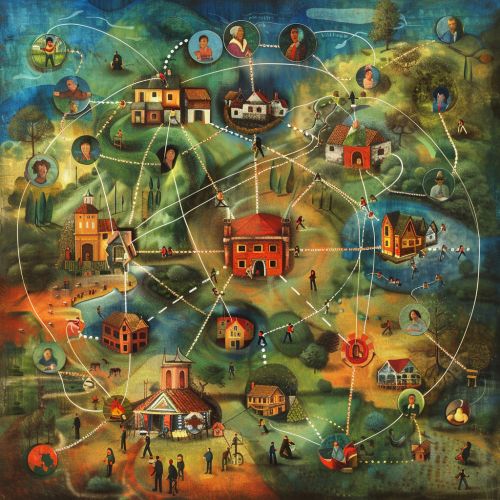Social Systems Theory: Difference between revisions
(Created page with "== Introduction == Social Systems Theory is a multidisciplinary framework for analyzing and understanding the complex interactions and structures within societies. This theory is rooted in the works of sociologists, anthropologists, and systems theorists who seek to explain how various components of a society interact to produce a coherent whole. The theory is particularly associated with the German sociologist Niklas Luhmann, who expanded on earlier systems theories...") |
No edit summary |
||
| Line 44: | Line 44: | ||
* [[Communication Theory]] | * [[Communication Theory]] | ||
[[Image:Detail-96105.jpg|thumb|center|Complex interactions within a social system, showing various subsystems such as economy, politics, and education interacting with each other.|class=only_on_mobile]] | |||
[[Image:Detail-96106.jpg|thumb|center|Complex interactions within a social system, showing various subsystems such as economy, politics, and education interacting with each other.|class=only_on_desktop]] | |||
== References == | == References == | ||
Latest revision as of 05:56, 4 July 2024
Introduction
Social Systems Theory is a multidisciplinary framework for analyzing and understanding the complex interactions and structures within societies. This theory is rooted in the works of sociologists, anthropologists, and systems theorists who seek to explain how various components of a society interact to produce a coherent whole. The theory is particularly associated with the German sociologist Niklas Luhmann, who expanded on earlier systems theories to develop a comprehensive model for understanding social phenomena.
Historical Background
The origins of Social Systems Theory can be traced back to the early 20th century with the development of General Systems Theory by Ludwig von Bertalanffy. Bertalanffy's work laid the groundwork for understanding systems as entities composed of interrelated parts. This approach was later adapted by sociologists such as Talcott Parsons, who applied systems thinking to social structures. Parsons' Structural Functionalism was a precursor to Luhmann's more complex and nuanced Social Systems Theory.
Core Concepts
Systems and Subsystems
In Social Systems Theory, a system is defined as a set of elements that are interrelated and interact to form a complex whole. Within a society, various subsystems such as the economy, politics, and education interact to maintain the overall social order. Each subsystem has its own specific functions and operates according to its own logic.
Autopoiesis
A key concept in Luhmann's theory is autopoiesis, a term borrowed from biology, which refers to a system's ability to reproduce and maintain itself. In the context of social systems, autopoiesis means that social systems are self-referential and self-producing. They generate their own elements and structures through internal processes.
Communication
Communication is the fundamental operation of social systems. According to Luhmann, social systems are constituted by communications rather than individuals. This perspective shifts the focus from individual actions to the processes and structures that facilitate communication within a society.
Functional Differentiation
One of the central tenets of Social Systems Theory is the concept of functional differentiation. This refers to the way in which different social functions are separated into distinct subsystems. For example, the legal system, the economic system, and the political system each serve different functions and operate according to different codes and logics. This differentiation allows for greater complexity and specialization within a society.
Structural Coupling
Structural coupling refers to the way in which different systems interact and influence each other while maintaining their distinct identities. For instance, the economic system and the political system are structurally coupled in that economic policies can influence political decisions and vice versa. However, each system retains its own operational logic and boundaries.
Complexity and Contingency
Social Systems Theory emphasizes the complexity and contingency of social phenomena. Complexity refers to the multitude of elements and interactions within a system, while contingency refers to the idea that social outcomes are not predetermined but are the result of various interacting factors. This perspective highlights the unpredictability and dynamic nature of social systems.
Criticisms and Debates
Social Systems Theory has been subject to various criticisms and debates. Some scholars argue that the theory is overly abstract and detached from empirical reality. Others criticize its focus on communication at the expense of individual agency. Despite these criticisms, the theory has been influential in shaping contemporary sociological thought and has been applied to various fields, including organizational studies, political science, and education.
Applications
Organizational Studies
In organizational studies, Social Systems Theory has been used to analyze how organizations function as complex systems. This approach emphasizes the importance of communication and the interdependence of various organizational subsystems, such as management, production, and human resources.
Political Science
In political science, the theory has been applied to understand the functioning of political systems and their interactions with other social subsystems. This includes the study of how political decisions are influenced by economic conditions, legal frameworks, and social movements.
Education
In the field of education, Social Systems Theory has been used to analyze the educational system as a distinct subsystem within society. This includes examining how educational policies are shaped by political decisions, economic conditions, and cultural values.
See Also


References
- Luhmann, Niklas. Social Systems. Stanford University Press, 1995.
- Parsons, Talcott. The Social System. Free Press, 1951.
- Bertalanffy, Ludwig von. General System Theory: Foundations, Development, Applications. George Braziller, 1968.
